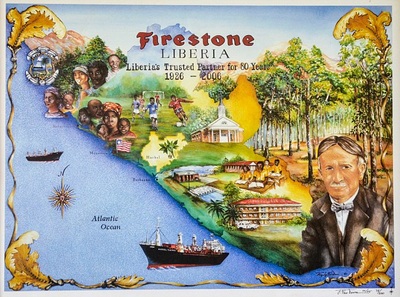Personal and financial insecurity
In West Africa, fear of infection has had a profound effect on the overloaded health systems and on daily life: people avoid physical contact, and families hit by the infection become socially isolated. In Liberia, the giant Firestone rubber plantation near Monrovia has seen at least 57 people—workers and their families living in and around the plantation—die of the disease. Surviving family members are entitled to only a $1,600 one-off payment (around 18 months’ wages), $300 for removing and disposing of the body, plus a bag of rice. They are ordered off the plantation. Orphaned children hanging around waiting to be paid feel the pressure to leave, though they have nowhere to go.
This is just one example of the social and financial impact that the Ebola outbreak has had on its victims and on businesses in the region. Of course, the workers suffer death, bereavement, isolation and an uncertain future, while businesses are only inconvenienced by the temporary manpower shortage and minimal payouts. Some of the bereaved have to move on before they can receive any benefits. President of the Firestone Agricultural Workers Union of Liberia, Austin Natee, complained that the labour laws favour the company and there are no workers’ pensions. In the company’s defence, Firestone director Edmundo Garcia said that they had been praised by the U.S. Center for Disease Control for its quick and effective response to the outbreak, and that at no time has the company considered closing the plantation as thousands of people rely on them for their livelihoods.
Travel restrictions
Tourism inevitably declines following any outbreak of a contagious disease. In Sierra Leone, military and police roadblocks have been set up to restrict movement, which adversely affects the supply of food and other goods. The commercial banks have cut their opening hours and some hotels have been empty since the summer. Several African states have restricted or banned travel from countries affected by the Ebola outbreak, and some airlines, including Kenya Airways, Emirates and British Airways have suspended all flights. Most travel insurance policies don’t include restrictive clauses for Ebola. Health insurance payouts for Ebola are unlimited, and unless governments advise against travel to a country, insurance claims for Ebola are unlikely to be excluded. However, fear of the disease inevitably affects the numbers of people willing to travel to West Africa. Border closures and travel restrictions throughout the region severely limit the import and export of goods as well as depleting tourist income, and tightening escape routes put pressure on multinational companies to withdraw.
A bleak outlook
The deepening crisis was at the top of the agenda when the IMF and World Bank met in October 2014. Its ramifications go far beyond concerns over public health, with the threat of an economic catastrophe in West Africa that could affect an entire generation. The three worst affected West African countries—Liberia, Sierra Leone and Guinea—all have fragile economies that the World Bank estimated could be hit by a $36.2 billion deficit be the end of 2015 if the Ebola outbreak cannot be controlled. Liberia, whose economy was recovering after 11 years of civil war, is now almost paralysed by the crisis with a rising budget deficit that will inevitably lead to the halting of critical funding to infrastructure projects. Foreign investors need to be reassured that investment is still viable in West Africa, despite the evacuation of foreign staff and the partial shut-down of operations by several big mining companies, and the scaling down of iron ore shipments from Liberia by China Union. These results of the crisis will be reflected in the inevitable economic slowdown, with a resulting decrease in tax revenues, increased borrowing and government expenditure. The crisis-hit agricultural sector will result in food shortages and price rises, with inflation caused by panic buying.
Huge sums of money will be spent by governments and NGOs to contain the outbreak and care for the sick and dying, but in purely monetary terms the cost to the economies of the affected countries will be far greater. Confusion and panic only adds to the disruption. Past outbreaks of deadly diseases, such as the 2003 Severe Acute Respiratory Syndrome (SARS) outbreak show that they always provoke over-reaction. According to the World Health Organisation (WHO) Situation Report published in September 2014, Ebola’s fatality rate varies between countries and is difficult to assess, but is probably closer to the average of 53% calculated from collating the reports from all affected countries than the usually quoted figure of 90% seen in previous outbreaks. Governments have to tread carefully between working to limit the spread of Ebola, causing disruption to the economy by necessary restrictions on movement, and avoiding panic. This is best achieved by being open about the problem and the degree of success, and in encouraging a constructive and unified response from the public and businesses.
Credit: Freelance article by Gemma Green
Disclaimer: The views & opinions expressed in any guest feature article on our site are those of the guest author and do not necessarily reflect the opinions & views of Africa Business Review.
Follow Erika Amoako-Agyei: Erika Amoako-Agyei is an intercultural business consultant with regional expertise on the sub-region of Africa. She works with global managers, students and companies expanding into Africa.
Twitter: http://twitter.com/Erika_Amoako
LinkedIn: contact Erika on LinkedIn
Facebook: Africa Business Review Face Page
Facebook: http://www.facebook.com/AfricaBusinessReview
Website: www. AfricaBusinessReview.net
Website: www.AfricaIntercultural.com
